I sometimes wonder if there should be an international ban on the production of new models of Tyrannosaurus and Triceratops (sure, an international ban on cutting down rainforests would be more constructive and more noble, but here I’m trying to use a ridiculous opening sentence to engage the reader’s interest. How am I doing so far?). I mean, don’t get me wrong – our old friends Trixie and Rex surely deserve their place of honour as the world’s favourite dinosaurs. But with so many models of these two on the market, you can’t help but wonder how any new depiction of these particular beasts could possibly bring anything new and exciting to the dinosaur collecting hobby (what’s that you say? Some of these products are actually intended as children’s playthings? Surely not!). So whenever I come across a new figure of these two, I must admit that I tend to sigh inwardly and see it as a lost opportunity, wishing that the manufacturer had instead invested in a quality model of some inexplicably long-overlooked dinosaur, like Centrosaurus or Ouranosaurus or any hadrosaur that isn’t Parasaurolophus. But just when I had decided there was no need for me to ever buy another plastic triceratops again, the Japanese company Sega decided to reissue the two models pictured below. What can I say ladies and gentlemen? The wow starts now!!!
These extraordinary models are manufactured by the Sega company of Japan, (mainly known for their computer games such as “Sonic the Hedgehog”), and both the models themselves, and clear information about them, can be very hard to come by outside of Japan. Most of the information I present here comes from an excellent blog post by fellow dinosaur collector Black Danter. These models are generally known to collectors as the “Sega dinosaur king” models or “Sega prize figures”. The former name seems to be a reference to a dinosaur-themed trading card game marketed by Sega, while the latter name alludes to the rather remarkable fact that these beautiful models are offered as prizes in a Japanese grabber-claw arcade game called “UFO Catcher”, again manufactured by Sega. It’s unclear to me if these models are also offered for sale by more conventional means. I have found suggestions on the internet that the reason why these models are so scarce on e-bay is that the only time they come up for sale is when someone in Japan successfully wins one from the claw-machine and decides to sell it!
Perhaps it gives some indication of the high respect paid to master-craftsmanship in Japanese culture that the names of the artists who sculpted both of these figures are known. The Triceratops was sculpted by Hirokazu Tokugawa, and first released in 2004, while the Tyrannosaurs was sculpted by Shinzen Takeuchi, and first released in 2007. I get the impression that relatively few of these original releases ever made it onto the market outside of Japan, and consequently they have been nigh-on unobtainable for many years. I remember being outbid on e-bay for the 2007 version of the Rex a few years back when the price went beyond $150. Fortunately, in 2014 the Sega company reissued both of these figures (but with notably different colour schemes to the original versions). The bad news is that even these 2014 reissues already seem scarce on vendor sites such as e-bay, with prices that are trending upwards. So if you’re interested in adding these majestic figures to your collection, my advice is to try to track them down sooner rather than later!
The first thing to note about these figures is that, in addition to being beautifully sculpted, they absolutely HUGE (yes that really is a standard-sized matchbox in the pictures, being dwarfed by the terrible lizards). This makes them a spectacular display piece, if you have room for them. The Rex measures about 52cm from snout to tail, and assuming a textbook length estimate of 12m for the animal in life, that equates to a scale of about 1:23. Similarly, the Triceratops model is about 40cm long, with a textbook length of 8m for the living animal, thus giving a scale of around 1:20. So, making due allowances for the in-exactitudes of measurement, these two models are essentially in the same scale and can be accurately displayed side by side. In life of course, they shared the same habitats in late Cretaceous North America, and fossils of Tyrannosaur “bite marks” on Triceratops bone leave no doubt that the former sometimes fed upon the latter.
Perhaps I should make it perfectly clear at this point that these two models are sold as separate figures and not as a pair; I’m just reviewing both of them simultaneously on this blog because pictures of them together look astoundingly cool…
Actually, I don’t really need to say much about the Rex figure, for the simple reason that Marc Vincent has already done a brilliant job reviewing the 2007 version of the Rex on a previous post which you can read here . The 2014 reissue appears to be exactly the same sculpt, but readers should be aware that the colour scheme is quite different. As you can see from the wonderful pictures in Marc’s review, The 2007 version had a really striking colour scheme in bold, contrasting shades of red and yellow. The 2014 reissue is much more restrained, with the yellow gone and the strong reds replaced by what could almost be called an apricot. I personally found the loss of the dramatic colours disappointing, but others may find the under-stated approach more plausible. Those willing to try their hand at a little repainting could probably bring the reissue into line with the delightful flamboyance of the 2007 original without too much trouble.
Before leaving the Rex, I should point out that this model can’t stand up without the transparent plastic prop that comes with the figure. For some, this might be a deal-breaker, but when the model is on the shelf, I don’t find the prop all that visually intrusive (one could eliminate the need for it altogether by filling the legs with plaster and screwing them onto a permanent wooden base). Many collectors would probably agree that the stand is justified by the fact it has allowed the artist to depict the animal in such uniquely charismatic pose – as far as roaring tyrannosaurs go, it doesn’t get much more ridiculously awesome than this! The proportions, musculature and skin detailing as sculpted by Shinzen Takeuchi are exceptional, and it’s hard not to love the speculative ridge of spiny back scutes, which brings a unique interpretation to this most familiar of dinosaurs. Overall, this sculpt succeeds dazzlingly at creating the impression of an astonishing yet authentic living animal. What a pleasure to see a restoration of the tyrant king that does NOT make the creature look like it just walked off the set of Jurassic Park!
While the Rex might grab the most immediate attention in photographs, Hirokazu Tokugawa’s Triceratops easily matches it in terms of the high standard of excellence set by these figures. Photographs on auction sites don’t do this guy justice – this is one of those dinosaur models that is quite amazing to hold in your hands and admire! The fluidity of the tail, the braced tension in the legs, the angle of the roaring head and the intensity of the eyes all combine to create a powerful impression of a massive animal frozen in that decisive moment of lunging towards an unseen foe (and it doesn’t take too much imagination to guess that said unseen foe might have teeth the size of bananas and ridiculously puny fore-arms).
Like the Rex, previous incarnations of the Sega Triceratops have had different colour schemes. Dinosaur toy forum members Black Danter and Boki have posted some fine pictures of these here. The 2014 version of this figure has a much more restrained and understated look, essentially decked out in delicate shades of steel-blue. The colour application on both the Triceratops and the Rex is superbly done from a technical standpoint, with beautifully airbrushed transitions in shading across the figures, giving both a tremendous sense of realism. Unlike the Rex, I feel that artistically, the 2014 Triceratops colours are actually an improvement over the previous versions… the subtle blues give this Triceratops a worthy sense of gravitas, and furthers the impression of the immense power that always swirls just below the surface of this ostensibly placid herbivore.
Lest I come across as being too completely besotted with these figures to give an objective review (DISCLAIMER: I am completely besotted with these figures); I suppose I had better make some attempt to point out their possible flaws. As part of the casting process, the legs and tail are made separately to the main body, with all parts manufactured from hollow vinyl. The legs are attached in the factory, but the purchaser has to fit on the tail. This is easily done – it just clips in without the need for glue – and if the job gives any trouble, just soften the vinyl a little by sitting the tail in warm water beforehand. The consequence of all this is that there are visible seam lines on both figures in the various places where appendages attach to the main body, but as you can see from the pictures, none of these are especially obtrusive, and with some basic modelling work you could fill and paint these to eliminate the seams if you like.
As noted above, the Rex cannot stand up without a transparent plastic stand, which certainly means the Rex has no real play value as a toy. Trixie however, has no such limitations. My two-year old son more-or-less ignores the Rex, but tells me the Triceratops is “lovely” and enjoys playing with it while his odd, dinosaur-collecting father monitors the situation carefully to ensure that no scuff-marks get onto the paint finish. In fact, I would go so far as to say that the Sega Triceratops is probably the best Triceratops toy available on the market today – only its rarity and relatively high price tag limit its potential in this regard.
It’s worthy of note that Hirokazu Tokugawa has sculpted the Sega Triceratops with the front legs angled and sprawled outwards (relative to the back legs, which are held much straighter underneath the body). This somewhat odd posture seems counter-intuitive, since we are used to seeing images of big mammals like elephants and rhinos, that carry their legs in a more-or-less vertical plane below the body. Since rhinoceros seem such an obvious analogue for horned dinosaurs, many depictions of Triceratops in art and sculpture show these dinosaurs with similarly column-like vertical legs. There’s just one problem… fossil trackways of horned dinosaurs leave absolutely no doubt that the front legs of these animals really were angled outwards relative to the back legs, as Hirokazu Tokugawa has correctly depicted (one evocative hypotheses to explain this posture is that it allowed the animal to turn and pivot rapidly around the body, so as to quickly bring the lethal horns to bear upon an approaching foe). I raise this point to emphasises the high standard of scientific accuracy, as well as artistic beauty, exemplified by these figures. It’s impossible not to be struck by the fact that in both these respects the quality of these Japanese models resoundingly outclasses the offerings of most Western manufactures – and by a very considerable margin.
My apologies for the longer than average review – I hope it’s been worthwhile to draw attention to two extraordinary models that deserve a much wider circulation in the hobby. Both of these figures have an amazing presence, and would take pride of place in any collection. In conclusion… may I wish a Rexy, merry Christmas to all readers and contributors to the dinosaur toy blog!
Tyrannosaurus available from Ebay.com here, and Triceratops available from Ebay.com here.
Disclaimer: links to Ebay and Amazon on the DinoToyBlog are affiliate links, so we make a small commission if you use them. Thanks for supporting us!




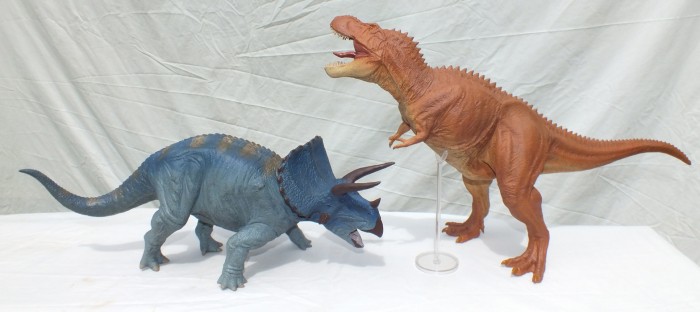
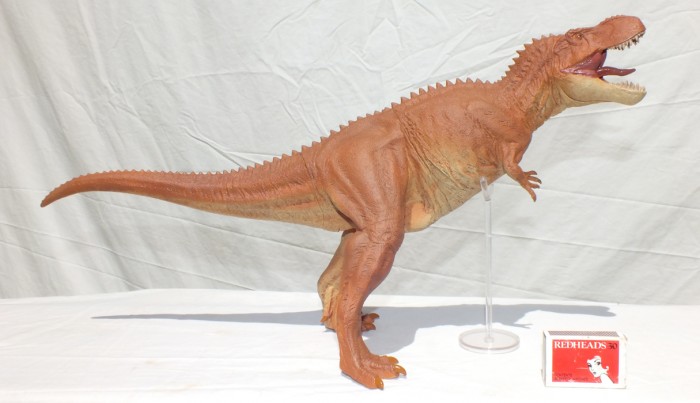
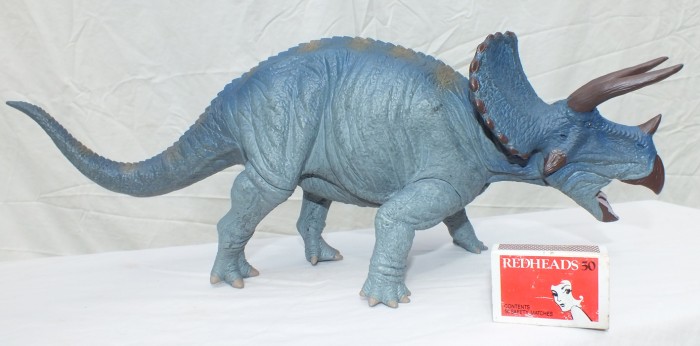
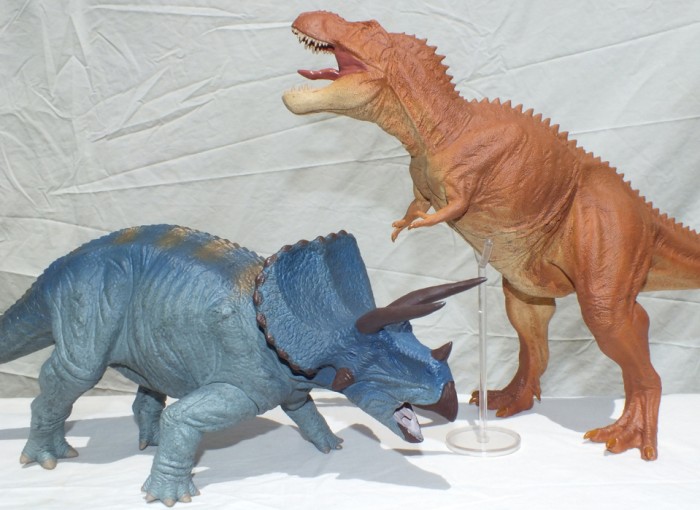
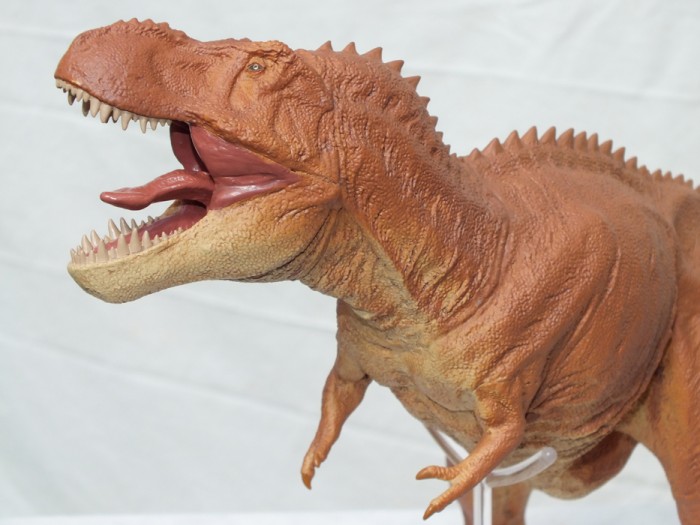
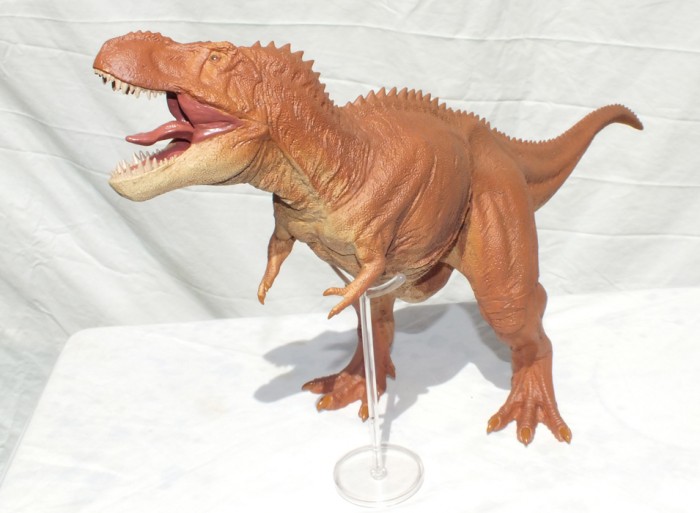
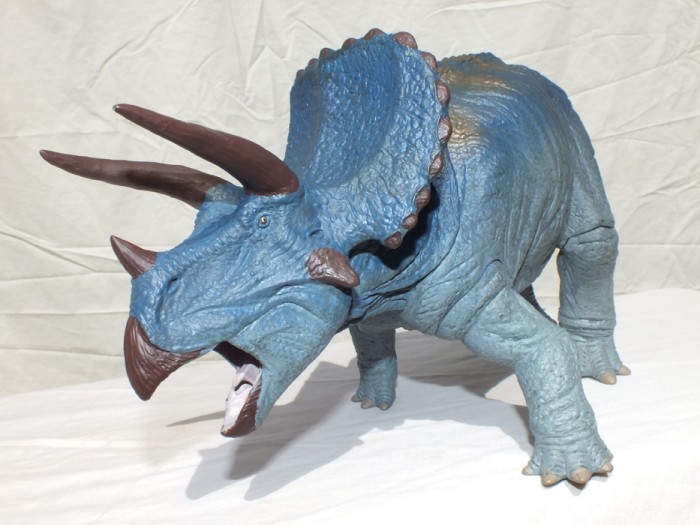
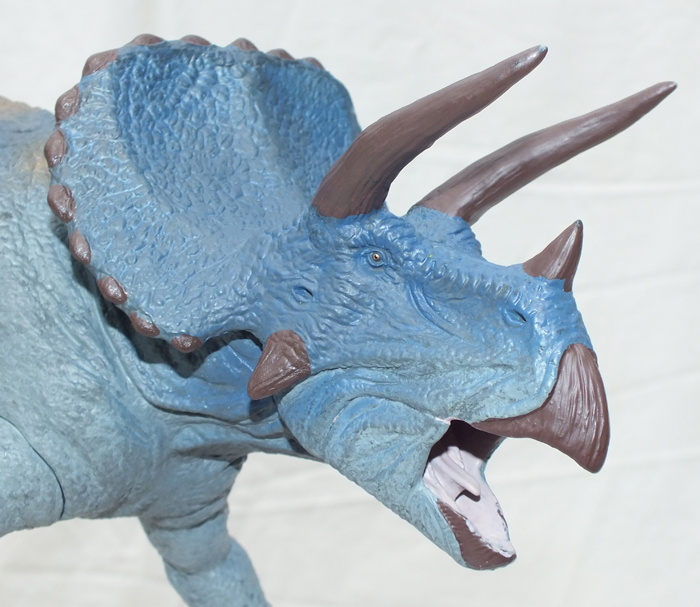
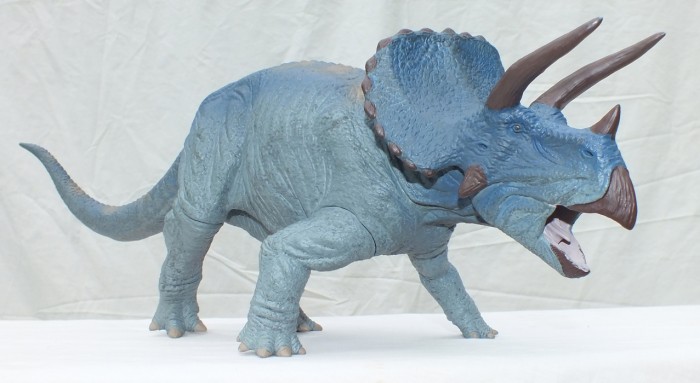
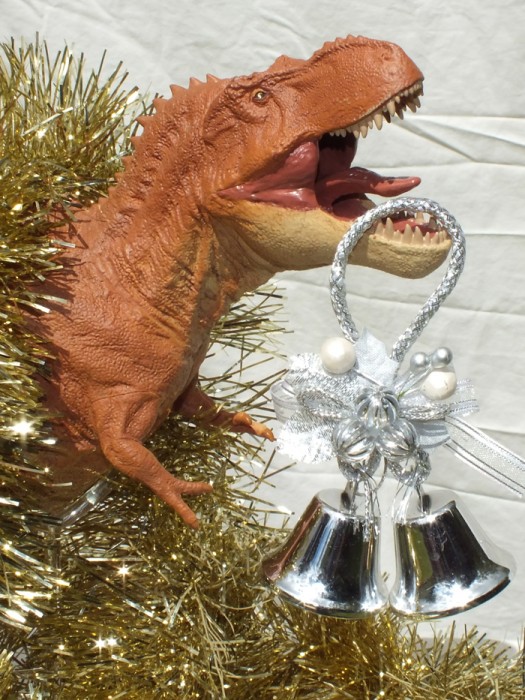
I appreciate your thought that children can easily learn and get more knowledge on the Dinosaur.
Thanks for the sharing an awesome blog.
Robot Dinosaur King
I thought I would post a reply in regard to some of the comments on “scientific accuracy”. Everyone has their own view on what this actually means. I freely admit that I’m no expert on anatomy, so when I review a figure, I use the description “scientifically accurate” for a figure that meets two criteria; 1) In their portrayal, the artist emphasises the subject as a convincingly real, living animal as opposed to an exaggerated “prehistoric monster”, and 2) The artist correctly depicts the broad brush strokes of anatomy and posture, as they are known by science at the time. By “broad brush strokes” I mean basic things like the arrangement of the limbs, how the tail is carried, how much flex there is likely to be in the neck… that kind of thing. I personally don’t look for more exactitude than this is a figure, one reason for this being that all dinosaur restorations everywhere have one thing in common – they are all incorrect. We will never know what any dinosaur looked like with 100% accuracy. For example, the point made about about short tails in ceratopsians is a valid one, but remember that skeletal diagrams can only tell us how long the bones of the tail were… cartilage and flesh would have added some further length to this, and what this “extra” length was, we can guess, but never know. So the reality is that any artist restoring a living animal from a fossil has some degree of “wiggle room”. As long as the artist succeeds in creating an impression of a plausible, living animal that is convincing overall, I personally am willing to give the artist the benefit of the doubt when it comes to smaller, individual details. This is purely a matter of opinion and each collector needs to make up their own mind about the level of accuracy they look for in a figure.
Well I just ordered my T. rex and I’m very excited! Thanks johnhall for the great review, pics, and seller links!
The author emphasized “scientific accuracy”? I’m sorry but Triceratops did not have a long tail like that, and I won’t even get started on the Rex. These two figures look just like the walked out of Jurassic Park so my advice to the author would be to look up modern day skeletals of the figures he is reviewing before claiming they are accurate. The paint schemes and the small eyes were a deal breaker on the two figures for me, regardless of anatomical accuracies.
I don’t see how the tyrannosaur is innacurate, how is it so? Aside from of course a lack of feathers, and the row of small spikes on the back. Aside from those two things, it seems relatively accurate. Much more so than the likes of Jurassic Park.
Yahoo Auctions Japan.
Nice to see an herbivorous dinosaur in an aggressive posture. Too often non-theropods are depicted in toy form as placid or frightened – quite different from rampaging elephants, charging bulls and other ‘gentle’ contemporary plant-eaters.
What beautiful figures! I’m not a huge fan of the coloration of the 2014 T.rex, but overall it’s top-tier quality. I do have a few technical qualms on the Trike, however. The tail is too long–ceratopsids had fat, abbreviated tails. The forefeet of the model have unguals on digits IV and V, but these digits were much reduced in all ceratopsians, especially ceratopsids, where they probably didn’t touch the ground. Finally, the frill shape is a lot closer to that of Arrhinoceratops than Triceratops, which actually makes me happy! I don’t think there are any Arrhinoceratops toys on the market, and it’s an oft-overlooked but awesome member of the group!
Great and comprehensive review! I highly recommend anyone interested in these two try to get them off of YAJ instead of eBay, as they are very very cheap (~$10 or even less if you’re lucky) on the former.
@DinoLord, what is “yaj”? A Google search turned up nothing. Thanks!
What is YAJ if you don’t mind my asking? I’m getting all kinds of hits for it on google, just not sure what I’m looking for…